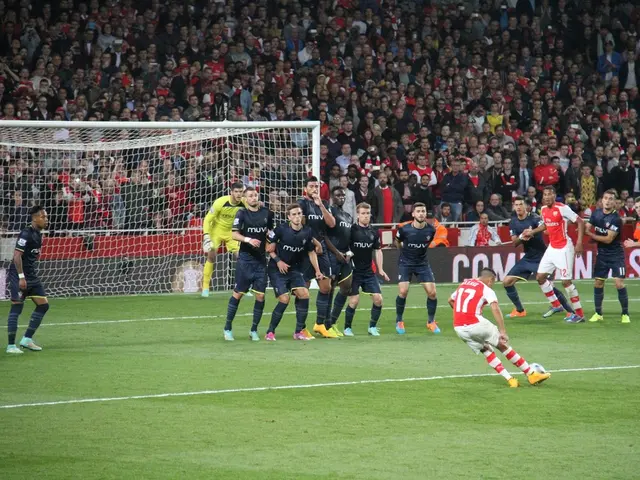Sensational Scandals and Controversies at Eurovision Song Contest
- *
Unresolved disputes lingering in collective recall - Ongoing Debates Continue to Linger in Public Consciousness
The Eurovision Song Contest (ESC) is infamous for its dramatic tensions, plagiarism accusations, and jaw-dropping controversies, alongside music phenomena and entrancing performances. Here, we delve into some of the most thrilling scandals and controversies that have rocked the ESC stage over the years.
Controversies of the Modern Era
In recent years, political and ethical tensions have become a common theme, with countries and artists raising voices against each other. In 2025 and 2024, calls for Israel's exclusion were made, with over 70 former ESC participants demanding Kan broadcaster's disqualification due to allegations of complicity in alleged Israeli genocide against Palestinians in Gaza. Similarly, in 2021, the EBU disqualified Belarus due to its lack of press freedom and two politically charged song submissions. Russia has been absent since 2022 due to the invasion of Ukraine.
Israel was also under scrutiny in 2024 after the European Broadcasting Union (EBU) rejected the submitted songs "October Rain" and "Dance Forever." Songstress Eden Golan (21) eventually represented Israel with "Hurricane" and achieved a 5th place finish. Dutch singer Joost Klein (27), on the other hand, was disqualified due to alleged threatening gestures against a camerawoman who filmed him. Though a criminal case against him was dropped, his disqualification left him missing his chance to perform "Europapa."
Plagiarism Allegations and Frenetic Performances
Numerous ESC artists have faced accusations of plagiarizing songs, most famously in 2013, when Cascada was accused of plagiarizing their song "Glorious" from the previous year's winning title "Euphoria." Despite a commissioned musical study concluding that Cascada's song was not a plagiarism, the band did not fare well, finishing 21st out of 26 places in the finale. Other plagiarism allegations were made against No Angels and pop star Michelle (53).
ESC scandals often involve passionate or provocative performances, such as in 1957 when Danish duo Birthe Wilke (89) and Gustav Winckler (1925-1979) caused a stir by sharing an 11-second on-stage kiss at the end of their final performance. In 2013, Finnish singer Krista Siegfrids (39) made headlines by kissing one of her dancers on stage during her performance of "Marry Me." Siegfrids, who wanted to promote love and tolerance, admitted that she wanted to make a statement about the lack of same-sex marriage rights in Finland, as it hadn't become legal until March 2017.
Iconic Bans, Disqualifications, and Political Rifts
Over the years, several countries have been disqualified or banned from the ESC due to political reasons. In 2016, Romanian singer Ovidiu Anton (42) was disappointed when TVR broadcaster's disqualification left him out of the event due to its debts of around 14.5 million euros. Georgia, too, has faced political tensions, with its song "We Don't Wanna Put In" considered too political against Russian Prime Minister Vladimir Putin and disqualified in 2009. Ukraine, although not entirely disqualified, had a political standoff when Russian singer Yuliya Samoylova (36) was banned from entering the country in 2017, prompting Russia's withdrawal from the contest that year.
In 1978, some Arab broadcasters refused to air the Israeli act, immediately switching to commercials when Izhar Cohen & The Alphabeta were shown. Remarkably, Jordan declared Belgium the winner, although Israel had won with the song "A-Ba-Ni-Bi."
Stunning Surprises and Diplomatic Blunders
On occasion, the ESC Delivers unexpected outcomes that captivate both viewers and contestants. While some winning songs were predictable, others sent shockwaves through Europe. One such occasion happened in 2011 when Azerbaijan won with the duo Ell & Nikki's "Running Scared," a song that the jury didn't prefer but that the audience loved. Unexpectedly, Azerbaijan emerged victorious due to the viewer's televote. In 2016, Ukraine's televote arguably shocked the contest when Ukrainian candidate Jamala (41) triumphed over the jury's selection, Australian singer Dami Im (36).
These dramatic moments show that the Eurovision Song Contest continues to captivate and confound viewers, stirring political tensions while offering emotional, powerful, and unforgettable performances. Whether or not you agree with the ESC's political stance, you can't help but be captivated by its audacious charm.
Enrichment Data:
- In 2012, after winning for Azerbaijan, Ell & Nikki were revealed by the DR, the Danish national broadcaster, as Russian citizens, although they represented Azerbaijan. Their real names are Evgeniy Myagkostupov and Nikita Dobrinsky.
- Many other countries, aside from those mentioned, have been disqualified or banned from the contest due to political reasons. These include Lithuania (1994), Morocco (1980-2012), and Turkey (1982-1983, 2013).
- In 2009, when the Ukrainian security service, SBU, imposed a travel ban on Russian contestant Julia Samoylova (36), it led to Russia's withdrawal from the contest. Controversy erupted due to Samoylova's performances in the Russian-annexed Crimea.
[1] "Belarus punished for breaching Eurovision rules," BBC News, June 29, 2021, https://www.bbc.com/news/world-europe-57315422
[2] "Strictly Eurovision: Belarus's 'Ya Nauchi Tebya' (I'll Teach You)," Eurovision Time Machine, May 24, 2021, https://eurovisiontimemachine.com/belarus-ya-nauchitebya-2021/
[3] "Georgia banned from Eurovision for song with anti-Putin theme," The Guardian, May 13, 2009, https://www.theguardian.com/music/2009/may/13/georgia-banned-eurovision-russia
- The European Parliament, the Council, and the Commission, as well as the Economic and Social Committee, the Committee of the Regions, have been engrossed in discussions about the ongoing controversies in the Eurovision Song Contest.
- Social media platforms have been buzzing with opinions about the political tensions and plagiarism allegations that have marred recent Eurovision Song Contests.
- Movies-and-TV shows have cashed in on the Eurovision Song Contest's sensational scandals, with several dramas featuring fictionalized versions of the contest's most controversial moments.
- Entertainment industry insiders often discuss the political undertones and scandals associated with the Eurovision Song Contest, particularly during awards season and panel discussions.
- Pop-culture enthusiasts debate the impact of the Eurovision Song Contest's controversies on European politics, with some arguing that it offers a platform for artists to voice their opinions.
- Sci-fi-and-fantasy fans have embraced the Eurovision Song Contest as a novel setting for alternate reality stories, with several works of fiction exploring parallel universes where the contest is a central event.
- General news outlets cover the Eurovision Song Contest's scandals and controversies, providing extensive analysis and commentary on the political implications of these events.
- Crime-and-justice journalists have highlighted the impact of the Eurovision Song Contest's controversies on the reputations of countries and artists, with some facing legal action as a result.
- Sports fans, particularly followers of football, champions-league, golf, sports-betting, and European leagues, have express their opinions on the Eurovision Song Contest, drawing comparisons between the competitive nature of sports and the contest.
- NBA enthusiasts have weighed in on the Eurovision Song Contest's controversies, with some drawing parallels between the political tensions and the often heated rivalries in professional basketball.
- Grand-prix fans have debated the merits of the Eurovision Song Contest compared to their favorite car races, with some arguing that the contest embodies the spirit of camaraderie and competition found in auto-racing.
- Weather forecasting services and sports-analysis experts have noted the impact of weather conditions on the Eurovision Song Contest, with some performances affected by poor weather or stage accidents.
- Mixed-martial-arts aficionados have found parallels between the Eurovision Song Contest's competitive nature and the sport of MMA, with both requiring strategic planning, agility, and strong stage presence to succeed.








